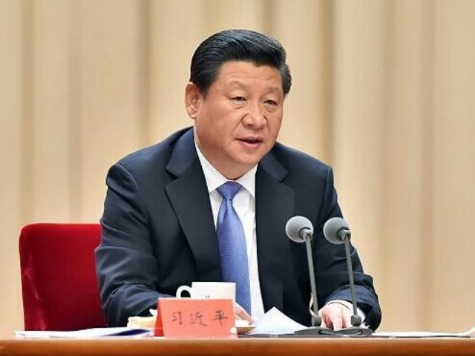President Xi Jinping of China has announced a campaign to eliminate unnecessary bureaucracy and streamline the Communist Party of China, a plan called “mass line” that requires strict adherence to party philosophy to “prioritize the interests of the people.”
According to state media outlet Xinhua, Xi’s announcement Wednesday of a second “mass line” campaign would trigger significant discipline reforms within the party. The campaign, explains the publication, “refers to a guideline under which CPC officials and members are required to prioritize the interests of the people and exercise power on their behalf.” It continues, “Based on arrangements made at the 18th National Congress of the CPC in November 2012, the campaign began in June 2013 with an aim of cultivating closer ties with the people.”
The “mass line” concept has its origins in Maoist thought; the “Mass Line” was to be considered the first and most important of the Lines of Effort in establishing a communist China that would endure.
That explanation may be ambiguous, but the results of the first such campaign was the removal of 160,000 “phantom staff” from the government, as well as streamlining the use of public vehicles and cessation of construction on 2,580 government buildings deemed “unnecessary.” Xinhua adds, “As promised, there was a thorough cleanup of undesirable work styles, with officials required to reflect on their own work and correct any bad practice.”
In addition to conventional government utilities, the first anti-corruption campaign deeply investigated the inner workings of Chinese state television, with even television anchors falling under arrest in crime sweeps. A top Chinese general was also arrested on alleged bribery and assorted corruption charges.
The announcement of a new campaign to streamline the efficiency of the Chinese Communist Party follows weeks of tensions between Beijing and the autonomous government of Hong Kong, where protesters took to the streets to oppose further meddling by the Chinese government in their electoral affairs. Protests have diminished in the past week as the Chinese government and Hong Kong leaders agreed to speak to student protest leaders about their demands, though the government of Hong Kong, now largely believed to be working in tandem with Beijing, canceled the talks Thursday.
In addition to tensions in Hong Kong, the Western province of Xinjiang has become a focal point for conflict with the Chinese government. Xinjiang is home to a large Muslim Uyghur population. The Chinese government has repeatedly accused Uyghur separatist groups of engaging in terrorist activity to shine a spotlight on the region, and Chinese authorities have, indeed, had to respond to multiple terrorist attacks in the area. The Chinese government has also expressed concern that Uyghur Muslims have been in contact with and working for the Islamic State.

COMMENTS
Please let us know if you're having issues with commenting.